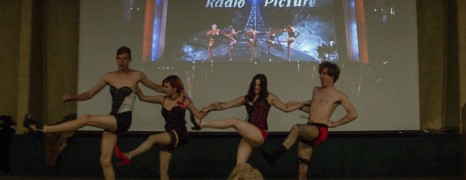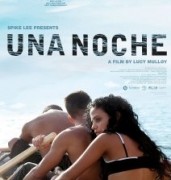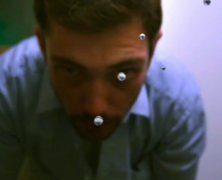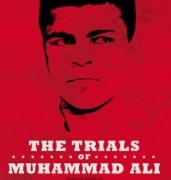The Rocky Horror Picture Show has been a cult classic since the 1970s. Often shown in time for Halloween, the British musical comedy is most frequently played in the theater while a shadow cast pantomimes in front of the screen. SFUAD has a much shorter history with the show, with only one year of this production under its belt. Peter Crowder, a sophomore in the film department, was at the head of the show last year and decided to take the reigns again for this fall. “I wanted to make it happen, so I asked the school and they said yes,” stated the outspoken Australia native. With support from the manager of The Screen, and permission from the nightly film clubs, Crowder has nearly single-handedly pulled together this Halloween weekend event. Last year’s cast included a total of 13 students and resulted in one midnight showing. This year, Crowder began with a more serious intention. He held auditions several weeks ahead of time, requiring students to dance, as well as giving them an option to sing during their time. A third of the final cast are returners, though few are revisiting their old parts. For this weekend’s show, expect a group of 19, scantily clad in various corsets and fishnet tights. These students, from varying departments and with all levels of experience, have managed to come together and embrace their inner actor. After weeks of rehearsals, and memorization of the entire movie by this diverse group of students, the three performances will be surely be memorable. The Rocky Horror Picture Show will be presented at The Screen 11 pm Oct. 25, midnight on Oct. 26, and again at 10 pm Oct....
Coming Attractions
posted by Charlotte Martinez
The Screen Presents: Oct. 25-31 Una Noche, Would You Choose Family or Freedom? Winner of Tribeca Film Festival’s 2012 Best Director Award, Lucy Mulloy’s Cuban drama tells a daring tale of a young Havana criminal trying to escape to Miami. Beth Accomando of PBS.org says, “Molly captures the Cuban spirit of energy, resiliency, resourcefulness, and passion. She does an impressive job of blending an intimate story of friends with a meticulously observed portrait of Havana.” Muscle Shoals, Most Talked About Documentary Is Still Playing! The true story of the small town with a big sound credits Tennessee’s spiritual “Singing River” as the birthplace of America’s most celebrated music. From the FAME Studios of Rick Hall, blacks and whites worked together in the heat of Alabama’s racial hostility to create what is called the “Muscle Shoals sound.” To attest to Shoals reputation are artists Gregg Allman, Bono, Clarence Carter, Mick Jagger, Etta James, Alicia Keys, Keith Richards, and Percy Sledge. In a documentary “propelled by gorgeous music and rich anecdotes,” David Gritten of The Telegraph calls the story “joyous, uplifting and as funky as the music at its heart.” Turandot (Royal Opera), Performance at the Screen Straight from London’s Royal Opera House, Director Andrei Serban brings forth the enchanting voices of Lise Lindstrom and Alasdair Elliott. The story? Princess Turandot has sworn that no man shall marry her unless he can correctly answer three riddles. Prince Calaf, captivated by Turandot’s beauty, takes up the challenge, determined to win her heart or die in the attempt. With a rich sound accompanying this dark and erotic fairy tale, the show guarantees an adventure in a beautiful but savage world. Playing at 11 am, Sun. Oct. 27. Tickets on sale here. Visit thescreensf.com for movie times....
Ready, Set, SFIFF
posted by Charlotte Martinez
“The best short films are student shorts,” says Jacques Paisner, executive director and co-founder of the Santa Fe Independent Film Festival. In its fourth year, the festival’s four-day event, Oct. 16-20, will be held at the Center for Contemporary Arts (CCA), Lensic Performing Arts Center, The Screen, and the newly opened Jean Cocteau Cinema in downtown Santa Fe. Dedicated to screening independent films, Paisner shares that a good amount of the festival’s 2013 submissions, as of March 1, came from the student population. Filmmakers, like those from SFUAD’s Film School are provided resources, “great equipment,”as Paisner puts it, which allows for the ideal collaboration experience. “If you’re in directing class…you’ll work with a writer from the writing class and that creates a really good short film,” he says. Furthermore, the shorts can act as a “calling card” because, according to Paisner, the festival circuit is one of the only places students gain exposure. It is here they can say,”‘look I’m a student filmmaker, collaborate with me.” For two of SFUAD’s own film students, the Santa Fe Independent Film Festival was a tremendous opportunity to expose their work. “We were planning on entering the festival before we shot the film,” says SFUAD film major Seth Fuller, whose film U46-Anomaly (Anomaly in the SFIFF listings) will be screened for the SFIFF at 9 p.m., Oct. 16 at the CCA. “We went into it trying to make it as polished as possible, to be a product to showcase what we are capable of. With that being said, we wanted to focus on the local community first since we are local filmmakers.” Fuller’s 13-minute short, shot last year in collaboration with New Mexico local Scott Hussion (producer) and fellow student Emmett Meade (producer/editor), is categorized as a sci-fi drama and...
The Screen Goes Digital
posted by Charlotte Martinez
“It’s all George Lucas’ fault,” says Peter Grendle, the Screen’s cinematheque manager, dispensing news of the world’s steady conversion of film projection to digital projection. According to Grendle, when director George Lucas filmed the last of his famous Star Wars episodes from 2002-2005, he loathed the idea of his precious turn-of-the-century movies going up on what Grendle calls the “shitty mall theaters” (whose projectionists pay little attention to presentation). Determined to get the best possible picture, Lucas shot Attack of the Clones and Revenge of the Sith in 100 percent high definition and premiered them in select theaters using digital projectors. Even if the mall theaters failed Lucus, at least the final prequels were forever in high definition. Since then, filmmakers have followed George Lucas, the “father of digital cinema,” into the inevitable future of digital. Hence, the annihilation of film! That’s a bit dramatic. Hence, movie company’s slow change from film to affordable new age cinema. And, for better or worse, the Screen, part of the 10 percent of theaters still capable of 35mm film projection, has finally gotten the boot: its 35mm projectors are retiring. A digital cinema package (DCP) will take their place. “We’ve been essentially an all blue ray theater for the past year,” Grendle says, “we do as many 35mm [films] as possible…but we have to [install] digital if we actually want to play movies. Otherwise the theater is just a place with, you know, great seats and a white wall.” Expert projectionist Barbara Grassia believes that the Screen’s transition is a positive change because “digital’s visual quality has been improving.” Grassia has participated in Film Festivals such as Sundance, Tribeca, Traverse City, Bermuda, the Dominican Republic, Telluride, Turner Classics, and Durango Independent Film Festival. “While the quality of 35mm presentation has been steadily declining,” Grassia says, “many multiplexes have allowed 35mm equipment to deteriorate to the point that presentation is seriously compromised.” Center for Contemporary Arts (CCA) Director Jason Silverman, who recently converted CCA’s primary film projection theater to digital, also points out that “DCP is pristine start to finish. Audio and picture quality are easily adhered to the filmmaker’s and studio’s intentions and we’re finding lots of interesting DCP content to show.” The creator and curator of the Screen, Brent Kliewer, agrees that “the benefits [of digital] will far outweigh anything negative.” He adds, “digital is where the industry is headed and to keep up we (meaning all independent theaters) must move forward.” It’s been a long time coming for the Screen, Grendle explains. Three years ago he received a letter from Fox, the high budget movie company whose films the Screen doesn’t play anyway, informing theaters that the company will no longer make 35mm prints. From there, Grendle was badgered by numerous companies to switch earlier rather than later. What was the final blow? The big companies gave in. The Regal Cinemas, a major branch of movie theaters, upgraded last year and according to Grendle, once the “big guys” convert, it means everyone else will follow. For a while, however, the 15 percent of film geeks, or independent filmmakers and theater owners, protested the digital conversion and treaded the pool of their financial difficult for the sake of saving film. “All the indies are exactly the same,” Grendle says, “They’re pushing out these small weird art movies for a small weird art crowd in small weird art theaters.” He explains that the Screen, like the CCA and newly opened Jean Cocteau in Santa Fe, was founded on “a love for film.” Furthermore, Brent Kliewer, original founder of all three respected cinematheques, is himself a “film junky,” a believer in projection and acoustic perfection. The Screen, for example, was built on an old soundstage and the 35mm projector bulbs burn so bright that they’re moved away from the body of the projectors so the film doesn’t burn. Regarding the art of film projection verses digital, Grendle...
Coming Attractions
posted by Charlotte Martinez
The Screen Presents: Sept. 27- Oct. 3 Short Term 12, the Best of Drama Directed by Destin Cretton and starring Brie Larson, this drama explores a young woman’s kind-hearted relationship with the kids who have slipped through the cracks of the system. When a challenging case comes along, however, this young woman must learn to make peace with her troubled past and open up to those around her. Winner of best actress and director in the Locarno Film Festival, Richard Roeper from Chicago Sun-Times calls it “one of the best movies of the year.” You Think You Know the Legend? What About the Man? Watch The Trials of Muhammad Ali, the Story of Ali’s Choice of Faith Over Fortune Academy award-nominated director Bill Siegel investigates boxing icon Muhammad Ali by following his life away from the ring. This documentary exposes the man who caused controversy in his race, his religion and his government, by refusing to serve in the Vietnam war. John DeFore of the Hollywood Reporter says the film “captures the thrill of Ali’s personality even for viewers with little interest in the sweet science.” Beckett on Film, Last Sunday of the Series Beckett on Film is a celebrated five part series of Samuel Beckett’s 19 plays, filmed by some of the world’s most talented directors, and featuring actors like Julianne Moore, Jeremy Irons and John Hurt. Beckett was awarded ‘Best TV Drama’ at the Sixth South Bank Show Awards Ceremony in 2002 and is called a celebration of artistic achievement. FREE ADMISSION every Sunday of September- 11 a.m. Doors will open at 10:30 a.m.. This Sunday, Sept. 29 watch the shorts Rough for Theater 2, directed by Katie Mitchell and Check the Gate: the Making of Beckett on Film. FYI, You Will...






 Jackalope Magazine is the student magazine of Santa Fe University of Art and Design. Building on the interdisciplinary nature of our education, we aim to showcase the talent of our university and character of our city.
Jackalope Magazine is the student magazine of Santa Fe University of Art and Design. Building on the interdisciplinary nature of our education, we aim to showcase the talent of our university and character of our city.
Recent Comments